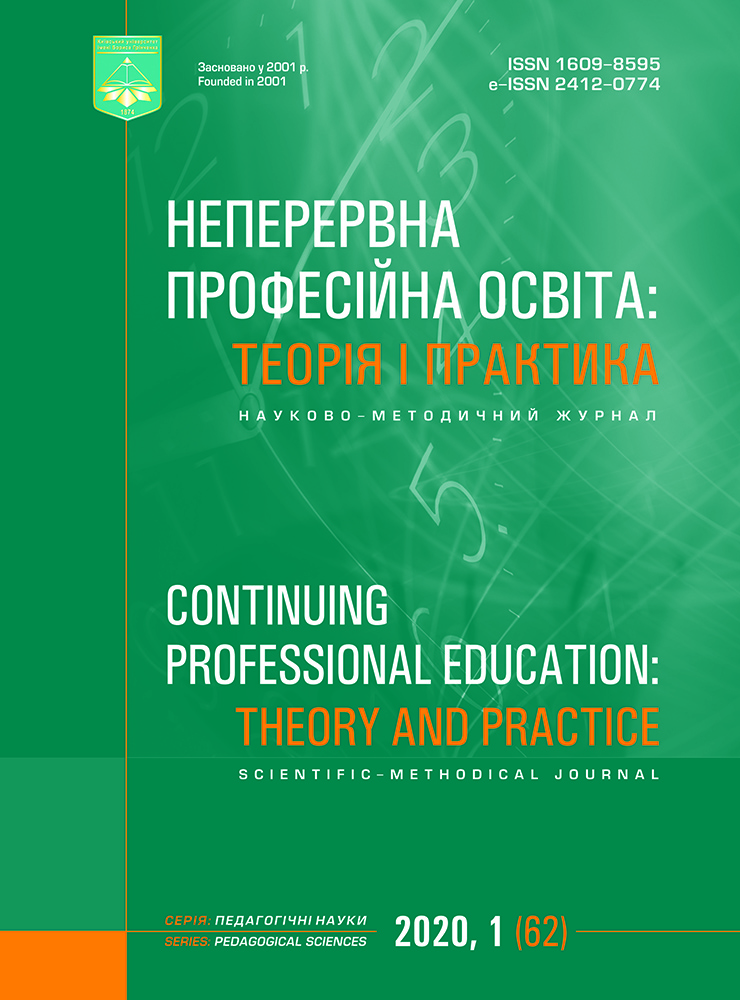PERSONAL AND MOTIVATION CRITERIA DEVELOPMENT OF MASTERS IN PRIMARY EDUCATION TO INNOVATIVE ACTIVITIES
DOI:
https://doi.org/10.28925/1609-8595.2020.1.6Keywords:
future masters of elementary education, innovative activity, motivational component, personal-motivational criterion, professional readinessAbstract
The article is devoted to the actual problem of professional preparation of future masters of elementary education for innovative activity. The author points out that the realities of the modern world, the transformation processes in the education system, the social procurement of the labor market encourage the revision of certain established views on the goals and objectives of higher education in general and the professional training of future masters of elementary education in particular. In this regard, there is a need to organize a system that would provide a purposeful process of forming the masters’ professional readiness for innovation activity. The study of this process allowed us to identify the main components of masters’ professional readiness for a specific activity, such as cognitive, motivational, reflexive, praxeological.
In the context of the of the study, the motivational component determines the formation of motives for innovation as a pledge of self-realization and self-development of undergraduates; interest in innovation as an important source of professional needs, personal growth, a strong interest in creativity and more.
In the article the level of the personality-motivational criterion is: conscious attitude of future masters of elementary education to innovative activity; formation of motives for professional self-improvement and self-development; stable orientation on humanistic values in pedagogical innovative activity; formation of professionally significant personality traits; the need for innovation; formation of creative potential; professional mobility.
In the article the level of formation of personality-motivational criterion (motivational component) of professional readiness of future masters of elementary education for innovative activity at the indicative stage of the experiment is analyzed.
References
Vynoghradova, O. V., Ghusjeva, O. J., Pilighrim, K. I. (2016). Problemy rozvytku motyvaciji personalu turystychnykh pidpryjemstv [Problems of development of tourism enterprises staff motivation]. Ekonomichnyj visnyk NTUU «KPI», 13, 56–63.
Vijevsjka, M., Krasovsjka, L. (2011). Formuvannja motyvaciji fakhivcja do bezperervnoji profesijnoji osvity [Formation of specialist motivation for continuing professional education]. Vyshha shkola, 1, 75–82.
Vovchasta, N. J. (2016). Motyvacija jak chynnyk vyvchennja inozemnoji movy za profesijnym sprjamuvannjam fakhivcjamy cyviljnogho zakhystu [Motivation as a factor in the study of a foreign language by professional guidance by civil protection professionals]. Pedaghoghika i psykhologhija profesijnoji osvity, 4, 48–57.
Ghalan, L. (2017). Udoskonalennja systemy motyvaciji personalu z urakhuvannjam vikovykh osoblyvostej pracivnykiv [Improvement of personnel motivation system taking into account employees’ age characteristics]. Skhid, 2 (148), 5–8.
Ghorkunenko, P. P. (2007). Pidghotovka studentiv pedaghoghichnogho koledzhu do naukovo-doslidnoji roboty [Preparation of the students of the pedagogical college for research work] Candidate’s thesis: 13.00.04. Vinnycjkyj derzhavnyj pedaghoghichnyj universytet imeni Mykhajla Kocjubynsjkogho.
Jerokhin, S. A., Nikitin, Ju. V., Nikitina, I. V. (2011). Koncepcija profesijnoji motyvaciji studentiv jak faktoru konkurentnosti na rynku praci. [The concept of professional motivation of students as a factor of competitiveness in the labor market]. Jurydychna nauka, 1, 20–28.
Кrevska, O. O. (2017). Motyvacijna determinacija profesijnoji samoefektyvnosti osobystosti [Motivational Determination of Professional Self-efficiency of Personality]. Psykhologhichni perspektyvy, 30, 86–95.
Turkot, T. I. (2011). Pedaghoghika vyshhoji shkoly [Pedagogy of the Higher School]. Kondor.
Chabanjuk, N. I. (2010). Osnovni determinanty rozvytku motyvaciji [The main determinants of the development of motivation.] Problemy zaghaljnoji ta pedaghoghichnoji psykhologhiji, XII (6), 376–384.
Shvets, D., Turba, O. (2011). Sotsiolohichne opytuvannia yak mekhanizm monitorynhu zadovolenosti studentiv stanom navchalno-vykhovnoho protsesu [A sociological survey as a mechanism for monitoring student satisfaction with the state of the educational process]. Gumanitarnij visnik Zaporizkoyi derzhavnoyi inzhenernoyi akademiyi, 47, 237–243.
Downloads
Published
How to Cite
Issue
Section
License
Copyright (c) 2020 Oksana Tsiuniak

This work is licensed under a Creative Commons Attribution-NonCommercial 3.0 Unported License.



